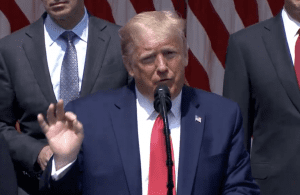Trump declares victory for himself as 13% of Americans are still out of work
While 2.5 million Americans got their jobs back after temporary virus-related layoffs, millions more remain out of work — including millions whose layoffs are permanent.

Donald Trump took a victory lap on Monday after the Bureau of Labor Statistics announced that the labor market added 2.5 million jobs in May, with the unemployment rate dropping to 13.3%, down from 14.7% in April.
“This is a rocket ship,” Trump said of the economy and jobs during a rambling speech from the Rose Garden, in which he attacked governors for coronavirus stay-at-home orders and demanded that states begin to reopen during the COVID-19 pandemic.
Missing from Trump’s remarks were any condolences for the tens of millions of Americans still out of work and the more than 100,000 who died from the coronavirus.
Trump’s bluster was preceded by celebratory tweets, in which he congratulated himself for the job increases and attacked presumptive Democratic presidential nominee Joe Biden.
However, Trump’s gloating may be premature, as the bureau’s report said 21 million Americans remain out of work.
And a further dive into the numbers showed that permanent layoffs rose by nearly 300,000 in May to 2.3 million — a troubling sign according to economists.
“Another attempt at perspective. 20 million people lost their jobs, causing unemployment to rise near Depression levels. Today’s data says 1-in-8 of those jobs returned. But the real question is what’ll happen to the rest? Even if half return we’re replaying the Great Recession,” Justin Wolfers, an economics professor at the University of Michigan, tweeted.
There’s more bad news nestled within the report that Trump celebrated and took credit for.
While the unemployment rate fell overall, it did not fall for Black Americans or Asian Americans.
“Among the major worker groups, the unemployment rates declined in May for adult men (11.6 percent), adult women (13.9 percent), Whites (12.4 percent), and Hispanics (17.6 percent). The jobless rates for teenagers (29.9 percent), Blacks (16.8 percent), and Asians (15.0 percent) showed little change over the month,” according to the BLS’ news release.
Economists are also concerned that Trump’s economic adviser Stephen Moore is using the report to say that no more relief aid is needed to stabilize the economy after the fallout from the COVID-19 pandemic.
According to Washington Post reporter Jeffrey Stein, Moore said the report “takes a lot of the wind out of the sails” of the relief package Democrats want to help states and localities that are struggling because of the pandemic.
“We don’t need it now. There’s no reason to have a major spending bill. The sense of urgent crisis is very greatly dissipated by the report,” Moore said.
In response, Betsey Stevenson, the former chief economist at the Department of Labor, was aghast.
“This is WRONG,” she said, referring to Moore’s comment. “There are 27.8 million people who have left the labor force, become unemployed, or who have been forced into part-time work because of the pandemic. We’ve turned around but we have a lot of work to do — including fiscal policy — to get out of this giant hole.”
Published with permission of The American Independent Foundation.
Recommended

Biden calls for expanded child tax credit, taxes on wealthy in $7.2 trillion budget plan
President Joe Biden released his budget request for the upcoming fiscal year Monday, calling on Congress to stick to the spending agreement brokered last year and to revamp tax laws so that the “wealthy pay their fair share.”
By Jennifer Shutt, States Newsroom - March 11, 2024
December jobs report: Wages up, hiring steady as job market ends year strong
Friday’s jobs data showed a strong, resilient U.S. labor market with wages outpacing inflation — welcome news for Americans hoping to have more purchasing power in 2024.
By Casey Quinlan - January 05, 2024
Biden’s infrastructure law is boosting Nevada’s economy. Sam Brown opposed it.
The Nevada Republican U.S. Senate hopeful also spoke out against a rail project projected to create thousands of union jobs
By Jesse Valentine - November 15, 2023








































































